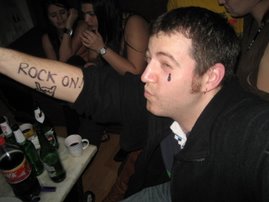It's been over a month since the last Tupac hologram performance at the Cochella festival, and it seems to have been a watermark moment in the previously sci-fi only notion of having virtual-only performers and/or allowing estates to perpetually allow their stars to keep producing material long after they've died.
As far as dead performers releasing new material, this moment was preceded by the Nat King Cole & Natalie Cole 'Unforgettable' record.
While there were rumors of the holographic Tupac going on tour with Snoop, Dre, and other monsters of rap music, these were ultimately refuted.
I'm sure there'd be a market for it, at least for people in my age group (plus or minus 15 years or so).
However, I think that the Tupac estate and some dedicated fans may find it crass. Perhaps there was substance to the hologram tour rumors and the estate shot it down.
But what about 50 years from now, or 100 years from now? I assume that by this point, technology would exist that would allow one to make voice recordings using the vocal imprint/range of various singers in the past who had extensive catalogs available (and perhaps in the public domain, should that concept still exist). It would be like the numerous colors available in a large crayon box. Maybe a vocal part would be enhanced with a little John Lennon in the mix.
As a Beatles fan, something seems somewhat off-putting to me with that thought.
But what if that technology existed now, and I wanted to recreate a super-group of singers from the dawn of audio recording technology; maybe making some type of ultimate vaudeville barbershop quartet mashup? Would anyone really mind or care? (I suspect even the most sincere preservationists would welcome such a gesture for the awareness it would bring to the barbershop-vaudeville genre).
Someday, the stars of my youth (and, in my head anyway) recent memory will be lucky to be a curiosity footnote in a history book (or file archive, whatever). At that point, re-purposing whatever of their body of work is available and left to society is fair game.
So perhaps future generations of late 20th-century rap culture historians will take it upon themselves to make a digital reunion of Biggie and Tupac, perhaps assembling some sort of forgiveness-themed concert.
Subscribe to:
Post Comments (Atom)

No comments:
Post a Comment